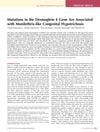Keratin 71 Mutations: From Water Dogs to Woolly Hair
September 2012
in “
The journal of investigative dermatology/Journal of investigative dermatology
”

TLDR A mutation in the KRT71 gene causes a hair disorder by disrupting hair follicle structure and texture.
In the 2012 study by Fujimoto et al., a missense mutation in the KRT71 gene was identified as the cause of autosomal dominant woolly hair/hypotrichosis in a Japanese family, marking the first human mutation in KRT71 linked to a hair disorder. The mutation, a heterozygous nucleotide change in exon 1 leading to a phenylalanine to cysteine substitution, disrupts the keratin intermediate filament network by affecting protein localization and heterodimerization with KRT14 and KRT18. This has a more severe impact on hair texture than KRT74 mutations due to KRT71's expression in all three layers of the hair follicle's inner root sheath. The study also connected the PA-PLA1α/LPA/LPA6 pathway to KRT71 expression regulation, suggesting a broader role in hair follicle development. Genetic evidence from mouse and canine models, as well as single-nucleotide polymorphisms in different human populations, further supports KRT71's role in determining hair texture across species. This research contributes to a better understanding of hair-shaft maintenance and could inform future hair disorder treatments.







